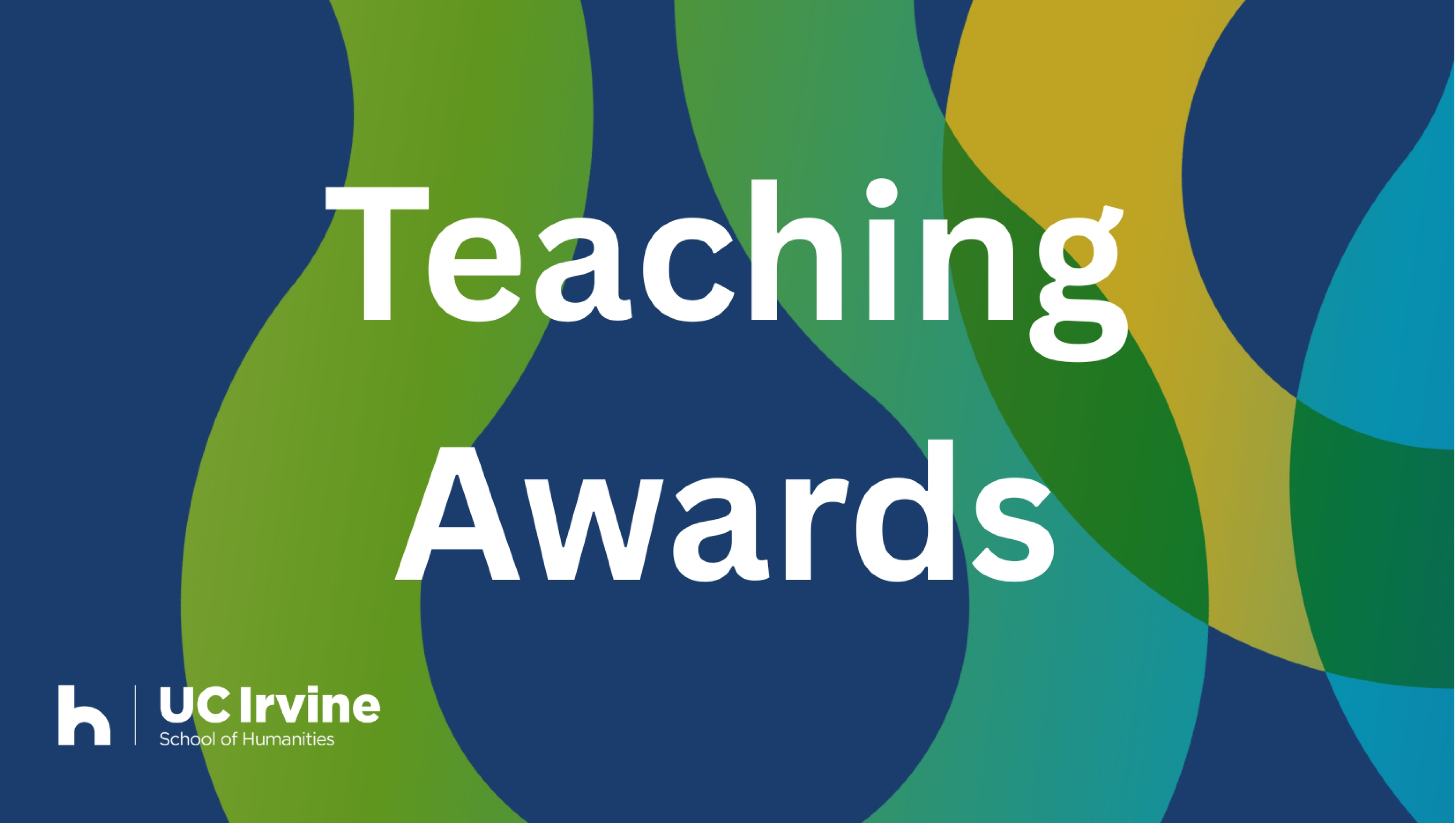
By Nikki Babri
At a time when education faces intense challenges, exceptional educators rise to meet the moment. This year’s School of Humanities Teaching Excellence Award recipients exemplify this spirit, each ensuring that the humanities continue to provide essential tools for understanding ourselves and our world.
Senate Faculty Teaching Excellence
Aleah Hernandez and Sri Basu McCall received the Senate Faculty Teaching Excellence Award in recognition of their innovative methods on student learning and classroom engagement.
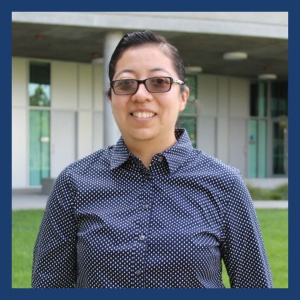
Aleah Hernandez, assistant professor of teaching and undergraduate director in classics, has revolutionized how students connect with ancient history through modern media. Integrating her own video game footage and historically-themed memes, Hernandez transforms traditional lecture formats as she gives immersive virtual “tours” of ancient sites. By creating new frameworks for understanding historical content, students discover that these virtual experiences enhance their retention, making Greek civilization accessible and memorable.
As a first-generation faculty member, Hernandez champions inclusive historical narratives. “The humanities provide the space in which we can analyze and reflect on the values, ideas and institutions of society, and as the world becomes more interconnected, I strive to show students that the ancient world was similarly diverse,” she explains. Beyond Greece and Rome, she highlights contributions from Africa and the Middle East while centering voices of slaves, immigrants and women, challenging students to reconsider inherited concepts of democracy and freedom that remain contentious today.
Hernandez is lauded by nominators for creating a climate in which each of her students can achieve success. One student summed it up by saying that as an educator Hernandez has the “humanities charm” – kindness, understanding and empathy.
Assistant Professor of English Sri Basu McCall rewires how students approach Early Black Atlantic studies by requiring them to be “open to surprises” about race and history. “The value of studying race in earlier periods lies not in an anachronistic projection back, but in recognizing that race itself has a history. It is not a transcendent phenomenon, and this history is neither linear nor predictable,” McCall explains.

Her courses, which encapsulate 18th- and 19th-century Atlantic World studies and the histories of slavery and abolition, deliberately expand understanding of Black literary history beyond social protest literature. McCall’s pedagogy evolved profoundly when she began teaching at UCI during the pandemic, recognizing the many professional and personal responsibilities that students juggle alongside their learning. Teaching Harriet Jacobs’ Incidents in the Life of a Slave Girl in virtual classrooms while some of her own students’ children played in the background sparked lively discussions about how that setting brought Jacobs’ work alive – she too was writing, reading and organizing while working and mothering.
Students and colleagues consistently praise McCall’s exacting yet inspiring approach. Students note the lasting impact of her courses on race and American culture, with one describing her “Slave Narratives” class as “one of the most significant courses taught at UCI.”
Pedagogical Innovation and Development
Assistant Professor of History Samantha De Vera earned the Pedagogical Innovation and Development Award for pioneering digital humanities integration in undergraduate education. Her approach transforms students from passive consumers of historical narratives into active creators of knowledge.
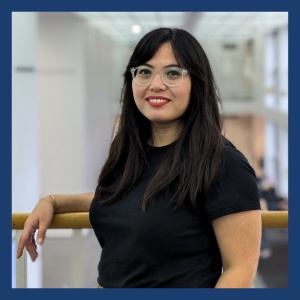
“As historians, we are dealing with human stories that require human perspectives,” she explains. “AI cannot do the critical work of historical research and read documents with the emotional intelligence of a person.” De Vera, a specialist in 19th-century U.S. history with a focus on race, incarceration and the Reconstruction era, teaches students to gather historical data independently and create maps and visualizations based on their research. She considers ArcGIS training to be critical for humanities students, recognizing it as a valuable tool for historical research.
De Vera’s pedagogy directly addresses contemporary challenges of misinformation and AI proliferation. Rather than prohibiting AI use, she demonstrates both its usefulness in organizing data and its critical limitations for interpreting historical information. Her success spans from intimate seminars to large lecture courses with nearly 400 students, proving that innovative pedagogy can scale effectively. Since joining UC Irvine in 2023, De Vera has become a leader in pedagogical innovation on campus, organizing workshops for faculty and graduate students across the School of Humanities.
Unit 18 Faculty Teaching Excellence
Talar Chahinian and Ghada Mourad won the Unit 18 Faculty Teaching Excellence Award for creating inclusive environments where diverse student populations thrive.
Talar Chahinian, a lecturer in Armenian studies, history and comparative literature, has led the Armenian language program at UC Irvine since its inception in 2018. “In an increasingly monolingual society where the value of a humanities education is often placed into question, university language courses, in many ways, become the frontline for cultural diversity,” Chahinian shares.
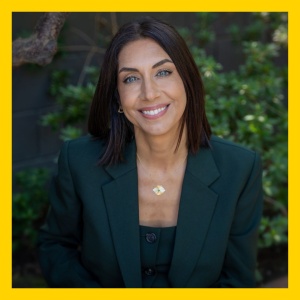
Because Southern California is home to the world’s largest and most diverse Armenian diaspora community, her curriculum honors heritage speakers while welcoming newcomers, creating spaces of cultural stewardship. Chahinian’s approach treats language as adaptive rather than static, incorporating both Eastern and Western Armenian standards while encouraging experimentation and celebration of difference.
Students feel supported, valued and empowered in her classroom, which she refers to as a “microcosm of pluralism,” where students teach and learn from one another. One particularly moving moment occurred when a grief-stricken student realized he could understand the Armenian eulogy at his grandfather’s funeral. “It reminded me how language instruction opens doors not just to fluency, but helps students experience belonging,” Chahinian reflects.
As a lecturer in French, comparative literature and Humanities Core, Ghada Mourad has developed a distinctive cross-disciplinary pedagogy. This unique position has allowed her to synthesize methodologies, creating an integrated approach that bridges active learning from French instruction, digital literacy from Humanities Core and critical thinking frameworks from comparative literature.
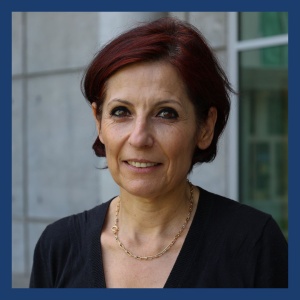
Mourad’s teaching philosophy has been profoundly shaped by her own experiences. “Being a francophone who is a product of French colonialism, I have taught French language and culture from an in-between space to which many of my multicultural students relate,” she shares. “Additionally, living through a civil war has taught me the urgency of empathy, the human cost of polarization and the fragility of social order.” This perspective allows her to connect with UC Irvine’s increasingly diverse, first-generation student population by challenging Eurocentric frameworks and validating students’ lived experiences.
Mourad’s commitment to global perspectives extends through campus programming that goes far beyond her lecturer requirements. Her campus programming – bringing authors like Rabih Alameddine for readings, screening documentaries and organizing a campus presentation of The Phoenix of Gaza XR Project – creates vital connections between academic study and urgent contemporary issues, expanding learning opportunities and enabling crucial discussions across campus.
SOH Mentoring Excellence
Heidi Tinsman, professor of history and gender and sexuality studies, won the Mentoring Excellence Award for mentorship that extends beyond academic guidance to encompass holistic student support and advocacy. As a feminist scholar of Latin American history who favors intersectional forms of power, she has recruited and supported diverse graduate students for years, the majority of whom are first-generation college students and underrepresented minorities.

“Building student confidence and excitement for learning matters as much to me as imparting any particular knowledge,” Tinsman emphasizes. “My teaching has impacted my scholarship as much as my scholarship informs my teaching – I feel most intellectually ‘alive’ when working with students.”
Tinsman spends hundreds of hours each year advising and supporting graduate research. She meets regularly with advisees to discuss multiple drafts of prospectuses, grant proposals and chapters. Students describe her generous support for them as both scholars and human beings, from providing extensive feedback to personally delivering medicine and groceries during the COVID-19 pandemic.
Congratulations to all recipients for their commitment to educational excellence and student success!
Interested in reading more from the School of Humanities? Sign up for our monthly newsletter.
